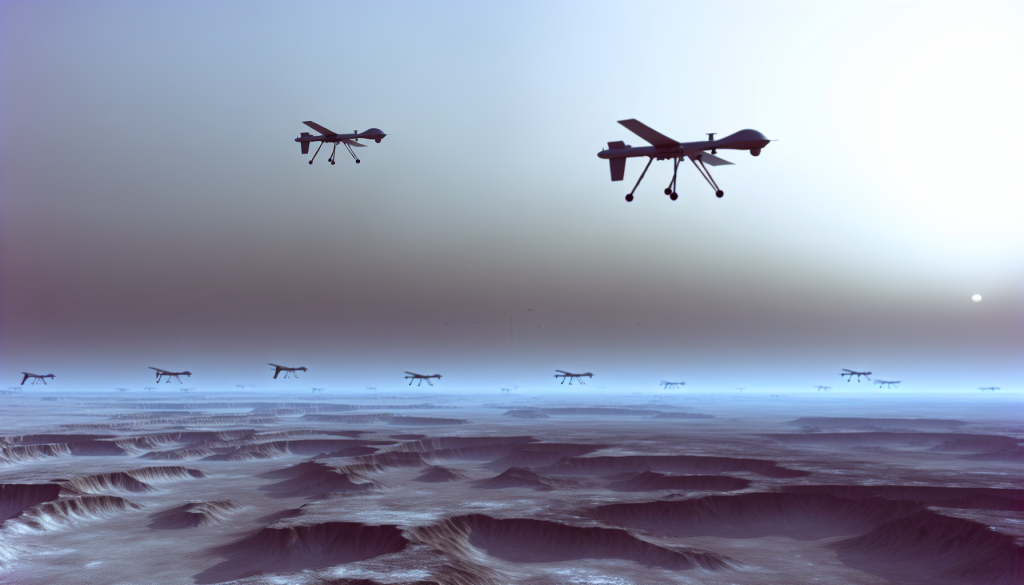The Rise of Autonomous Weapons: A Double-Edged Sword
As the technology landscape rapidly evolves, the integration of artificial intelligence (AI) into military frameworks poses unprecedented ethical dilemmas and risks. Recent reports from the U.S. Department of Defense (DoD) and various watchdog organizations highlight significant concerns regarding the deployment of autonomous weapon systems, often referred to as “killer robots.” These systems possess the ability to operate without human intervention, leaving many to question the moral implications of delegating lethal decision-making to machines.
The Regulatory Environment
A haunting aspect of the discussion is that current Pentagon policies do not categorically prohibit the development and use of these autonomous systems. The Public Citizen report emphasizes this shortfall, arguing that such technologies “inherently dehumanize the people targeted” and blur the lines of accountability and legality in warfare. The report cautions that allowing weapons to make their own decisions can lead to violations of international human rights laws, raising alarms that cannot be easily dismissed.
In January 2023, the Pentagon did issue a directive related to autonomous and semi-autonomous weapon systems, stating their use should align with ethical principles. However, this directive is not without loopholes. It allows for the bypassing of mandatory reviews under conditions of urgent military need, creating a pathway for hasty development and deployment without comprehensive oversight.
Ethical Considerations
The moral landscape becomes murky when we consider the ramifications of machines making decisions about life and death. Jessica Wolfendale, a philosophy professor specializing in political violence, articulates a critical perspective, noting that machine-based decision-making could lead to significant accountability gaps. If an autonomous weapon misidentifies a civilian as a legitimate target, who ultimately bears the responsibility? This question haunts the legal frameworks that govern warfare, potentially rendering traditional accountability measures ineffective.
Wolfendale argues that attributing moral responsibility becomes problematic when the decision-making capacity is shifted to machines. Such scenarios risk creating a situation where no individual is held accountable for grave mistakes, a disconcerting outlook for those invested in human rights and ethical governance.
Military Contractors and AI
Despite these concerns, American military contractors are aggressively pursuing the development of autonomous weapons systems. Companies like General Dynamics and Anduril Industries are already creating unmanned tanks, drones, and submarines. Furthermore, the competition in this domain is driven not only by military objectives but also by geopolitical rivalries and corporate profit motives. The rapid advancement of these technologies poses a threat to global stability as nations race to outpace one another in AI weaponry.
While advocates of these systems argue they enhance precision and reduce civilian casualties, historical data tells a different story. U.S. drone strikes, often heralded for their accuracy, have nonetheless resulted in significant civilian casualties, primarily due to flawed intelligence. As such, the promises of technological advancement in warfare often obscure the underlying complexities and dangers associated with autonomous decision-making.
The Role of Human Judgement
Critics point out that the ethics of warfare cannot solely hinge on the technologies used; they must consider the intent and decisions of those who deploy them. Jeremy Moses, an associate professor focusing on the ethics of war, posits that the dehumanization of combatants starts long before the deployment of advanced technology. Autonomous weapons, like any other tools of warfare, do not change the fundamental realities of conflict and violence; rather, they may even enhance the dehumanization process by allowing military actors to engage in targeted actions from a distance, thereby decreasing their immediate moral reckoning.
Moses also challenges the narrative that positions these technologies as inherently ethical or precise. He posits that technologies should not be viewed as neutral; they serve as instruments to legitimize violence and may ultimately perpetuate cycles of conflict.
Global Implications
The ramifications of autonomous weapon systems are not limited to American interests. As these technologies proliferate, nations around the world are watching and adapting their own military strategies. The call from some advocates for the U.S. to refrain from deploying such systems—while simultaneously supporting global treaties against their use—highlights a growing recognition that these technologies could escalate tensions and conflict globally.
In places like Gaza, autonomous systems are being implemented, with reports of robots and remote-controlled devices being integrated into military operations. This use raises significant ethical concerns, particularly when the technology is presented as a means to minimize human risk while dehumanizing those targeted by its operations.
The Need for Scrutiny
In the rush to harness the capabilities of AI in warfare, the ethical landscape becomes ever more complex. As Wolfendale highlights, the allure of advanced technology may blind us to the ingrained biases and moral dilemmas that accompany the use of AI in military contexts. Making decisions about war through the lens of technological advancement can overshadow the critical need for rigorous ethical evaluations and the essential human dimensions of military engagement.
The trajectory of AI in warfare necessitates an urgent reassessment of our ethical frameworks and legal standards. As discussions advance, it becomes imperative for policymakers, military leaders, and society at large to confront the ethical questions surrounding autonomous weapons rather than allowing technological optimism to dominate the conversation.
With these considerations, the dialogue around autonomous weapons is far from settled. Each advancement in military technology invites scrutiny and demands accountability, emphasizing that the conversation around AI in warfare is only just beginning.

